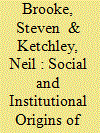| Srl | Item |
| 1 |
ID:
144035


|
|
|
|
|
| Summary/Abstract |
China’s high-speed railway (HSR) has experienced rapid development in the past five years. The author explains that institutional factors, namely national monopoly on market resources, a highly centralised management system and substantial support from various departments in the State Council, have contributed to the sector’s growth. Adhering to the independent innovation strategy and by means of “mobilising resources to accomplish large undertakings”, the state created an industrial development model known as the “government-oriented integrated innovation model”, which capitalises on the institutional advantages as mentioned above. Through this model, with the entire national railway network being operated under a unified command and dispatch system, China was able to acquire core technologies from the market, integrate a complex array of subsystems and develop a portfolio of production and research, all of which were conditions essential for achieving the rapid development of high-speed railway in China. This article, in analysing the institutional origins of China’s development of the high-speed railway, sheds light on China’s unique institutional advantages in shaping its national competitive advantages in the world economy today.
|
|
|
|
|
|
|
|
|
|
|
|
|
|
|
|
| 2 |
ID:
161521


|
|
|
|
|
| Summary/Abstract |
This article explores how the Chinese socialist media censorship system was established and operated without losing legitimacy at the local level in 1950s Shanghai, and why media workers complied with the censorship in daily journalistic practice. Under the strong influence of the liberal model of media in the West that assumes the relations between the state and media as antagonistic and often reduces state-media relations to a struggle between the state repression and media compliance/resistance, media or media workers in the PRC are portrayed either as victims of the strict and repressive media censorship without much agency or as ready to resist censorship whenever possible. This research demonstrates that media workers complied with the censorship procedure because they saw it as a process of legitimization of the news reporting and commentaries in the absence of formal institutions for media censorship and heavy reliance on self-censorship in the People’s Republic of China (PRC).
|
|
|
|
|
|
|
|
|
|
|
|
|
|
|
|
| 3 |
ID:
159505


|
|
|
|
|
| Summary/Abstract |
Under what conditions did the first Islamist movements organize? Which social and institutional contexts facilitated such mobilization? A sizable literature points to social and demographic changes, Western encroachment into Muslim societies, and the availability of state and economic infrastructure. To test these hypotheses, we match a listing of Muslim Brotherhood branches founded in interwar Egypt with contemporaneous census data on over 4,000 subdistricts. A multilevel analysis shows that Muslim Brotherhood branches were more likely in subdistricts connected to the railway and where literacy was higher. Branches were less likely in districts with large European populations, and where state administration was more extensive. Qualitative evidence also points to the railway as key to the movement’s propagation. These findings challenge the orthodoxy that contact between Muslims and the West spurred the growth of organized political Islam, and instead highlight the critical role of economic and state infrastructure in patterning the early contexts of Islamist activism.
|
|
|
|
|
|
|
|
|
|
|
|
|
|
|
|